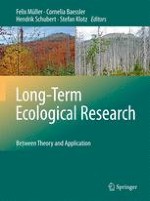2010 | OriginalPaper | Buchkapitel
6. Introducing the Next Generation of Ecosystem Research in Europe: LTER-Europe’s Multi-Functional and Multi-Scale Approach
verfasst von : Michael Mirtl
Erschienen in: Long-Term Ecological Research
Verlag: Springer Netherlands
Aktivieren Sie unsere intelligente Suche, um passende Fachinhalte oder Patente zu finden.
Wählen Sie Textabschnitte aus um mit Künstlicher Intelligenz passenden Patente zu finden. powered by
Markieren Sie Textabschnitte, um KI-gestützt weitere passende Inhalte zu finden. powered by
